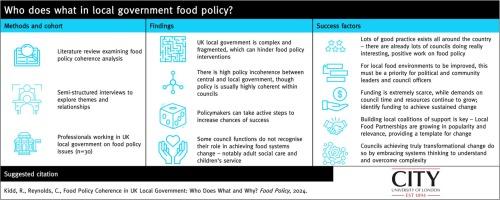地方政府的粮食政策一致性:谁在做什么,为什么?
IF 6.8
1区 经济学
Q1 AGRICULTURAL ECONOMICS & POLICY
引用次数: 0
摘要
背景在英国,食品政策通常由国家政府制定,但通常由议会解释和执行。本研究探讨了哪些地方政府职能参与了粮食政策,它们是如何合作的,以及它们的政策立场有多一致。研究方法研究人员利用两个学术数据库中的 "地方当局"、"地方政府"、"食品 "和 "食品政策 "等检索词进行了文献综述:Scopus 和 Web of Science,以及 Science Direct 上 Food Policy 的结果。然后,他们与地方政府雇员和地方政府各职能部门的代表机构进行了 30 次半结构式访谈。他们使用 NVivo 对访谈进行了分析,以突出主题,其中包括议会优先考虑的粮食政策问题;地方政府职能及其相互关系;外部利益相关者;以及成功因素。然而,中央政府和地方政府之间的政策并不一致,缺乏国家战略和零敲碎打的权力下放方法阻碍了议会改善粮食系统的努力。议会的一些职能特别 "联合",在公共卫生、贸易标准、环境卫生、经济发展、规划和可持续发展等方面都有良好的多功能和多机构工作安排。其他职能部门,尤其是成人社会关怀、市场和应急规划部门,则更难参与其中;访谈结果表明,粮食政策并不是这些职能部门的优先事项。伙伴关系安排为利用现有网络提供了良机。议会可以采取更多措施,加强相邻议会之间的联合工作。本文章由计算机程序翻译,如有差异,请以英文原文为准。

Food policy coherence in local government: Who does what and why?
Background
In the UK, food policy is often made by national government, but typically interpreted and implemented by councils. This research explores which local government functions are involved in food policy, how they work together and how coherent their policy positions are. It builds on earlier work to map the food policy actors at national government level and to understand local government’s many functions.
Methods
The researchers conducted a literature review using search terms including ‘local authority’, ‘local government’, ‘food’ and ‘food policy’ across two academic databases: Scopus and Web of Science, plus results from Food Policy on Science Direct. The total number of papers identified and analysed was 99. They then conducted 30 semi-structured interviews with employees of local authorities and representative bodies covering the various functions of local government. They analysed the interviews using NVivo to highlight the themes, which included priority food policy issues for councils; local government functions and how they relate to each other; external stakeholders; and success factors.
Findings
Despite the high degree of complexity, fragmentation and granularity in local government, there appears to be a high degree of food policy coherence within and between individual councils. However, there is policy incoherence between central and local government, where a lack of national strategy and piecemeal approach to devolution have hindered councils’ efforts to improve the food system. Some functions of councils are particularly ‘joined up’, with good multi-function and multi-agency working arrangements in public health, trading standards, environmental health, economic development, planning and sustainability. Other functions, notably adult social care, markets and emergency planning, have been harder to engage; interview responses suggest food policy is not a priority for these functions.
Conclusions
For food policy interventions in local government to be successful, they need to be accompanied by adequate long-term funding; a coalition of support; and to be seen as a priority by relevant stakeholders. Partnership arrangements provide good opportunities to make use of existing networks. Councils could do more to increase joint working between neighbouring councils.
求助全文
通过发布文献求助,成功后即可免费获取论文全文。
去求助
来源期刊

Food Policy
管理科学-农业经济与政策
CiteScore
11.40
自引率
4.60%
发文量
128
审稿时长
62 days
期刊介绍:
Food Policy is a multidisciplinary journal publishing original research and novel evidence on issues in the formulation, implementation, and evaluation of policies for the food sector in developing, transition, and advanced economies.
Our main focus is on the economic and social aspect of food policy, and we prioritize empirical studies informing international food policy debates. Provided that articles make a clear and explicit contribution to food policy debates of international interest, we consider papers from any of the social sciences. Papers from other disciplines (e.g., law) will be considered only if they provide a key policy contribution, and are written in a style which is accessible to a social science readership.
 求助内容:
求助内容: 应助结果提醒方式:
应助结果提醒方式:


